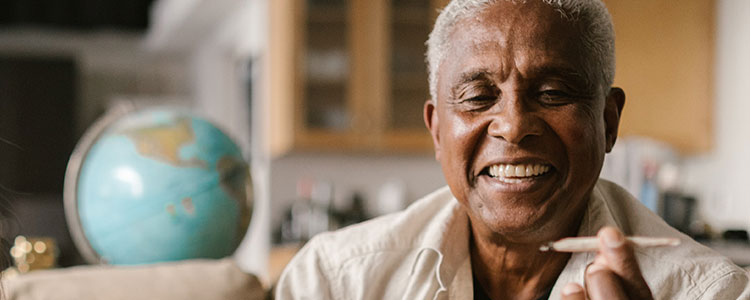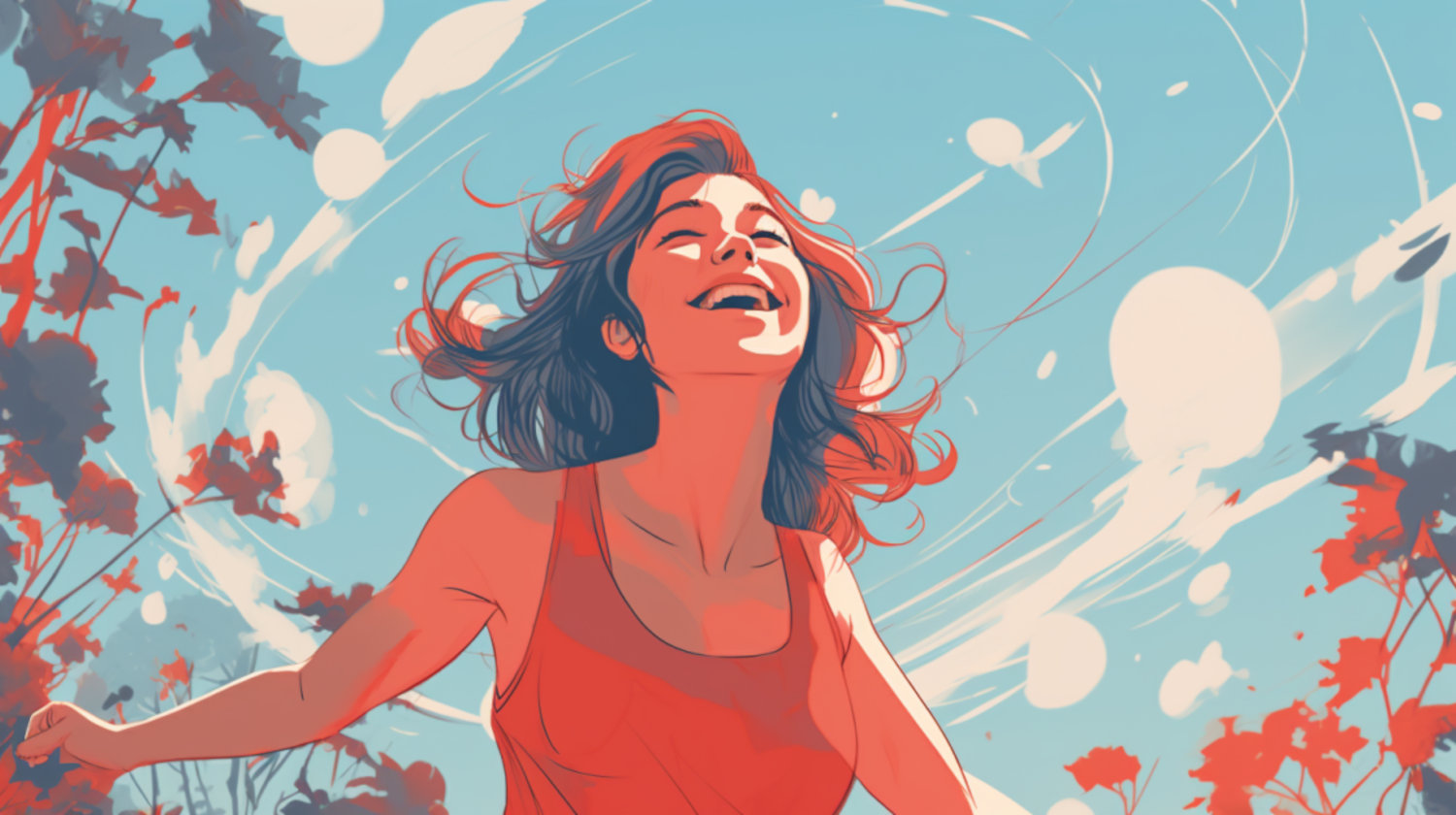In This Article
- Which Cannabinoids Help Most With Depression?
- THC
- CBD
- CBG
- Which Cannabinoid Concentrations and Ratios Help Most With Depression?
- Certificate of Analysis
- High CBD, Low THC
- Consider Terpenes
- Trial and Error
- Ask a Pro
- The 5 Best Strains for Depression Based on Cannabinoid Content
- Sour Tsunami
- Mystery 89
- Ringo’s Gift
- Cherry Wine
- Special Sauce
- References
Key Takeaways
- Preliminary studies show that medical cannabis may ease depression symptoms as an alternative treatment..
- Cannabis strains featuring high CBD and small amounts of THC and CBG offer the best relief.
- Patients report relief with strains like Sour Tsunami, Ringo’s Gift, and Cherry Wine.
Depression affects millions worldwide, often resisting traditional treatments. That’s where alternative options come in. Medical cannabis, in particular, has shown promise in easing depression symptoms.
With a wide range of strains and cannabinoid concentrations available, patients can find the perfect match for their condition. However, with so much variety, it can be challenging to find the best cannabis for depression without any of the negative effects, like paranoia. That's where knowing the right combinations of cannabinoids becomes an essential part of narrowing in on the best treatment.
Which Cannabinoids Help Most With Depression?
Research on the best cannabis strains and cannabinoids for depression is still in its infancy. However, preliminary studies suggest that tetrahydrocannabinol (THC) and cannabidiol (CBD), as well as minor compounds like cannabigerol (CBG), interact with the body’s endocannabinoid system (ECS). The ECS is responsible for regulating mood, stress, and emotional response, among other functions.
THC
While THC is well-known for its intoxicating effects, it also exhibits potential antidepressant properties by modulating serotonin levels via CB1 receptor activation.1 However, THC’s use for depression is double-edged.
Chronic and heavy use might reduce dopamine activity and decrease cerebral activation in response to reward. Both of these are associated with the development of depression symptoms like anhedonia, a reduced ability to experience pleasure.2
Given these effects, using THC alone or in high doses for depression may be counterproductive. It may carry a higher risk of adverse effects such as nausea, vomiting, and paranoia, which can make depression worse.
CBD
CBD is renowned for its non-intoxicating effects and potential in managing depression. It has been shown to improve mood and cognitive functions, especially in high CBD, low THC strains.¹,3
Unlike traditional antidepressants that target monoaminergic pathways, CBD potentially offers a novel approach. It may be effective as a standalone treatment or an adjunct for patients resistant to standard treatment. CBD may be especially beneficial for those with comorbid mood and anxiety disorders.4
In a pilot study focused on acute bipolar depression, CBD at doses of 150 to 300 mg/day was observed to significantly improve depressive symptoms within the first eight weeks of treatment.5
Additionally, most patients prefer CBD over traditional medications because it typically involves fewer side effects. Those few who report side effects typically experience mild issues such as depressed mood, addiction, dry mouth, and gastrointestinal problems.6
However, results depend on dosage, strain, individual factors, and consumption methods.³ More studies are needed to understand its therapeutic potential in humans fully.
CBG
CBG, though less researched compared to THC and CBD, has shown noteworthy results in treating depression and other mood disorders. Patient reports indicate that CBG-dominant cannabis often outperforms traditional medication and may also boost the efficacy of conventional antidepressants.7
Which Cannabinoid Concentrations and Ratios Help Most With Depression?

While there is still not enough definitive research into which cannabinoid concentrations and ratios are most effective for depression, preliminary studies offer some insights.
For instance, when considering THC for depression, research suggests that low THC and high CBD concentrations provide the most therapeutic benefit. Analysis from the Strainprint app shows that users experienced greater relief with these ratios compared to higher THC concentrations.¹
CBG also appears promising based on recent findings. In a patient survey, the majority reported that CBG-dominant cannabis were more effective for depression management than conventional medicines.⁷
Many users wonder if indica strains, or weed in general, worsen depression. However, the broad labels of indica and sativa don’t reliably predict individual reactions. The effects of cannabis depend more on the specific cannabinoids and terpenes in each strain.
If you’re considering cannabis treatment, products containing a broad range of cannabinoids seem to provide a more effective approach to symptom management compared to relying on a single cannabinoid. For example, using THC alone can lead to overintoxication that results in side effects such as anxiety, paranoia, and confusion.
Depression can make simple decisions feel overwhelming. However, selecting the right cannabis strains can go a long way in managing symptoms. Here are some practical tips to help you navigate the extensive options and find what works best for you.
Certificate of Analysis
The best way to confirm you’re getting the right strain for your condition is to refer to a Certificate of Analysis (COA) provided by the manufacturer. It is typically found on product packaging or label as a QR code for your convenience.
A COA provides an exact percentage of cannabinoids, tested by an independent testing lab. In some cases, it may include terpene levels, which are also known to play a role in managing depression.
High CBD, Low THC
When looking for the best cannabis strains for depression, steer clear of high THC options. These often have a higher risk of side effects like anxiety, paranoia, nausea, and vomiting, all of which can make depression symptoms worse.
Instead, opt for strains high in CBD and low in THC to offset any adverse effects. CBD is non-intoxicating and has many of the same health benefits as THC. If possible, look for strains that include CBG, which is also known to relieve depression symptoms.
Consider Terpenes
In addition to cannabinoids, terpenes also play an essential role in the effects of cannabis strains and contribute to the entourage effect, enhancing the overal benefits. Some terpenes like caryophyllene, pinene, and linalool are known for their mood-enhancing properties. When selecting a strain, consider researching those rich in terpenes that could help manage depression.
Trial and Error
Since cannabis effects can vary by person, sometimes the best approach is trial and error. Start with small doses of new strains to determine how they affect your symptoms and adjust accordingly.
Ask a Pro
A healthcare provider experienced in cannabis medicine can provide personalized recommendations based on medical history, current treatments, and specific symptoms. They can point you in the right direction to find the perfect strain for you.
The 5 Best Strains for Depression Based on Cannabinoid Content

Keeping symptoms of depression in check may be possible with the help of medical cannabis. Patients can choose from a variety of strains for depression, particularly those with high levels of CBD and low levels of THC and CBG. Below are five strains to consider.
Sour Tsunami
Contrary to its intense name, Sour Tsunami provides gentle effects. With 13% CBD and 1% THC, it often produces a mild high that eases stress and anxiety, which are common triggers to depression, while also enhancing mental clarity. Its diesel and earthy aromas are a plus.
Mystery 89
Mystery 89 stands out with its high CBD levels, low THC content, and small amount of CBG. This combination provides therapeutic benefits with minimal intoxicating effects, making it ideal for combating anxiety, stress, and insomnia. Its earthy and spicy flavors enhance the experience.
Ringo’s Gift
Ease depression symptoms with Ringo’s Gift, a CBD-rich strain with moderate-to-high levels of CBD and small concentrations of THC and CBG. Patients report feelings of relaxation and focus, which help reduce anxiety and stress. Many appreciate the comforting nutty and woody aroma.
Cherry Wine
Cherry Wine boasts about 12% CBD, along with 1% each of CBG and THC. This blend helps calm your nerves, relieving anxiety, stress, and pain. Consumers also love this CBD-rich strain’s notes of cherry, cheese, and pepper.
Special Sauce
Manage depression symptoms with Special Sauce’s 15% CBD and minimal THC and CBG levels. Some feel at ease and focused without significant intoxicating effects. This strain also boasts a hoppy and berry flavor.
References
- Feingold D, Weinstein A. Cannabis and Depression. Cannabinoids and Neuropsychiatric Disorders. 2020;1264:67-80. doi:https://doi.org/10.1007/978-3-030-57369-0_5
↩︎ - Langlois C, Potvin S, Khullar A, Tourjman SV. Down and High: Reflections Regarding Depression and Cannabis. Front Psychiatry. 2021;12:625158. Published 2021 May 14. doi:10.3389/fpsyt.2021.625158
↩︎ - García-Gutiérrez MS, Navarrete F, Gasparyan A, Austrich-Olivares A, Sala F, Manzanares J. Cannabidiol: A Potential New Alternative for the Treatment of Anxiety, Depression, and Psychotic Disorders. Biomolecules. 2020; 10(11):1575. https://doi.org/10.3390/biom10111575
↩︎ - Pinto JV, Saraf G, Frysch C, et al. Cannabidiol as a Treatment for Mood Disorders: A Systematic Review. Can J Psychiatry. 2020;65(4):213-227. doi:10.1177/0706743719895195
↩︎ - Pinto JV, Crippa JAS, Ceresér KM, et al. Cannabidiol as an Adjunctive Treatment for Acute Bipolar Depression: A Pilot Study: Le cannabidiol comme traitement d’appoint de la dépression bipolaire aiguë : une étude pilote. The Canadian Journal of Psychiatry. 2024;69(4):242-251. doi:10.1177/07067437231209650 ↩︎
- Wieckiewicz G, Stokłosa I, Stokłosa M, Gorczyca P, Pudlo R. Cannabidiol (CBD) in the Self-Treatment of Depression-Exploratory Study and a New Phenomenon of Concern for Psychiatrists. Front Psychiatry. 2022;13:837946. Published 2022 Mar 22. doi:10.3389/fpsyt.2022.837946
↩︎ - Russo EB, Cuttler C, Cooper ZD, Stueber A, Whiteley VL, Sexton M. Survey of Patients Employing Cannabigerol-Predominant Cannabis Preparations: Perceived Medical Effects, Adverse Events, and Withdrawal Symptoms. Cannabis and Cannabinoid Research. 2021;7(5). doi:https://doi.org/10.1089/can.2021.0058 ↩︎
The information in this article and any included images or charts are for educational purposes only. This information is neither a substitute for, nor does it replace, professional legal advice or medical advice, diagnosis, or treatment. If you have any concerns or questions about laws, regulations, or your health, you should always consult with an attorney, physician or other licensed professional.




